Leadership for SMEs: Addressing Ambiguity, Performance, and Ethics
VerifiedAdded on 2020/01/07
|6
|1600
|173
Report
AI Summary
This report delves into the critical role of leadership within Small and Medium Enterprises (SMEs), exploring key concepts such as ambiguity, uncertainty, and the limits of knowledge. It examines how effective management and leadership skills influence strategic performance, emphasizing the importance of performance management systems. The report highlights the significance of self-reflection for addressing future developments, including innovation and specialization. Furthermore, it analyzes the impact of cultural and ethical values on the ability to work constructively in diverse environments, emphasizing the challenges and considerations for leaders. The conclusion summarizes the key findings and reinforces the importance of understanding these factors for SME success. References are provided to support the findings.
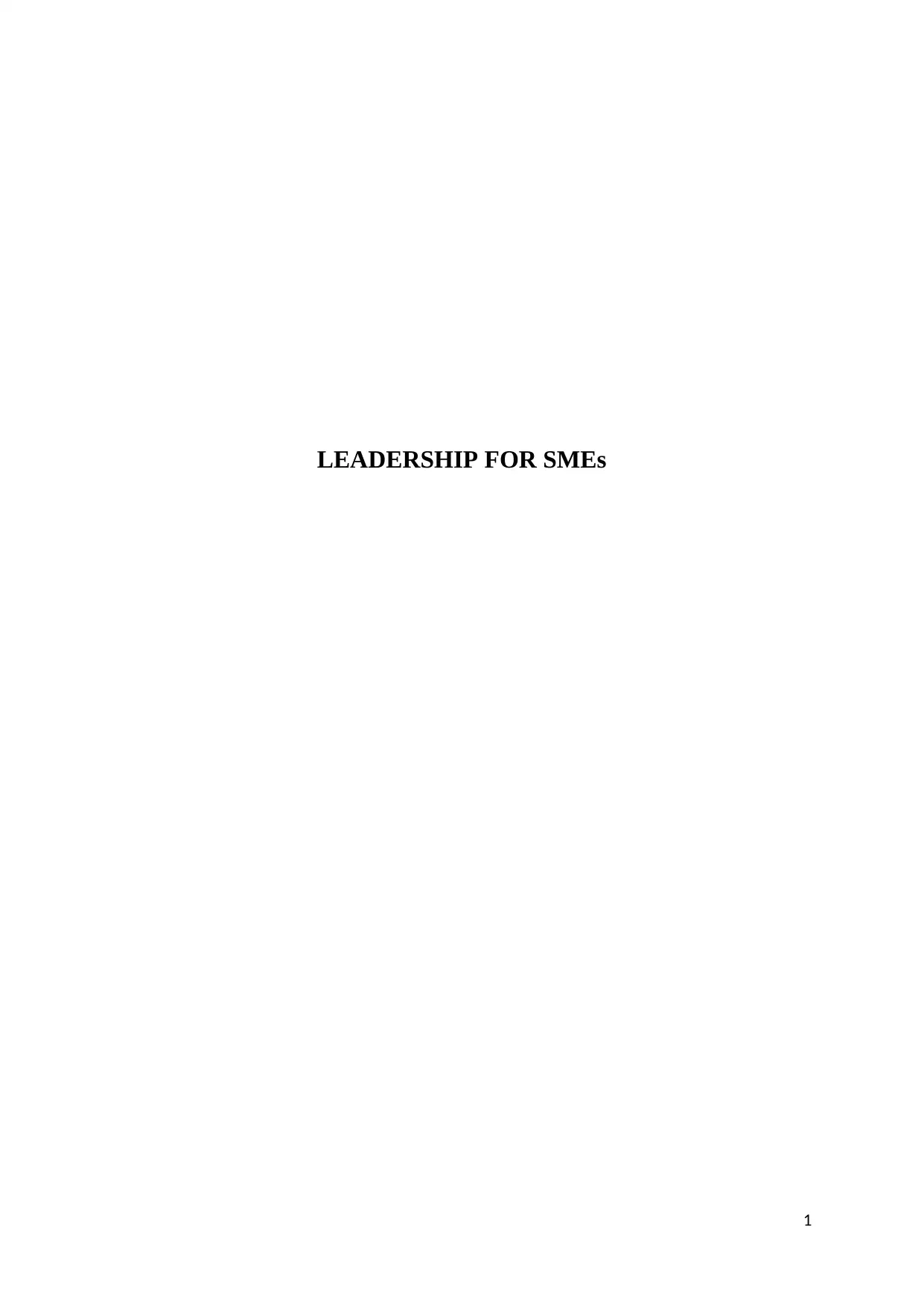
LEADERSHIP FOR SMEs
1
1
Paraphrase This Document
Need a fresh take? Get an instant paraphrase of this document with our AI Paraphraser
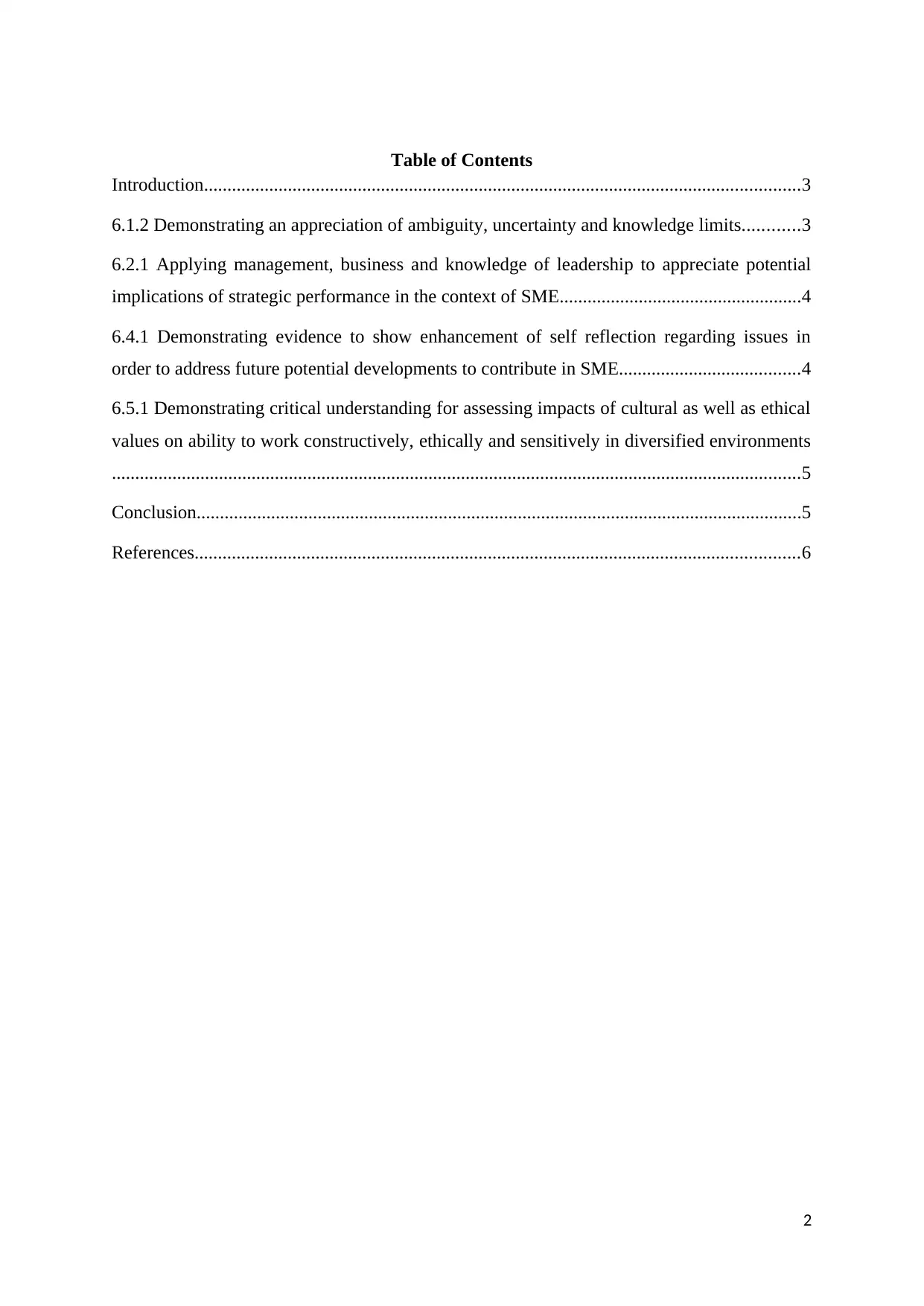
Table of Contents
Introduction................................................................................................................................3
6.1.2 Demonstrating an appreciation of ambiguity, uncertainty and knowledge limits............3
6.2.1 Applying management, business and knowledge of leadership to appreciate potential
implications of strategic performance in the context of SME....................................................4
6.4.1 Demonstrating evidence to show enhancement of self reflection regarding issues in
order to address future potential developments to contribute in SME.......................................4
6.5.1 Demonstrating critical understanding for assessing impacts of cultural as well as ethical
values on ability to work constructively, ethically and sensitively in diversified environments
....................................................................................................................................................5
Conclusion..................................................................................................................................5
References..................................................................................................................................6
2
Introduction................................................................................................................................3
6.1.2 Demonstrating an appreciation of ambiguity, uncertainty and knowledge limits............3
6.2.1 Applying management, business and knowledge of leadership to appreciate potential
implications of strategic performance in the context of SME....................................................4
6.4.1 Demonstrating evidence to show enhancement of self reflection regarding issues in
order to address future potential developments to contribute in SME.......................................4
6.5.1 Demonstrating critical understanding for assessing impacts of cultural as well as ethical
values on ability to work constructively, ethically and sensitively in diversified environments
....................................................................................................................................................5
Conclusion..................................................................................................................................5
References..................................................................................................................................6
2
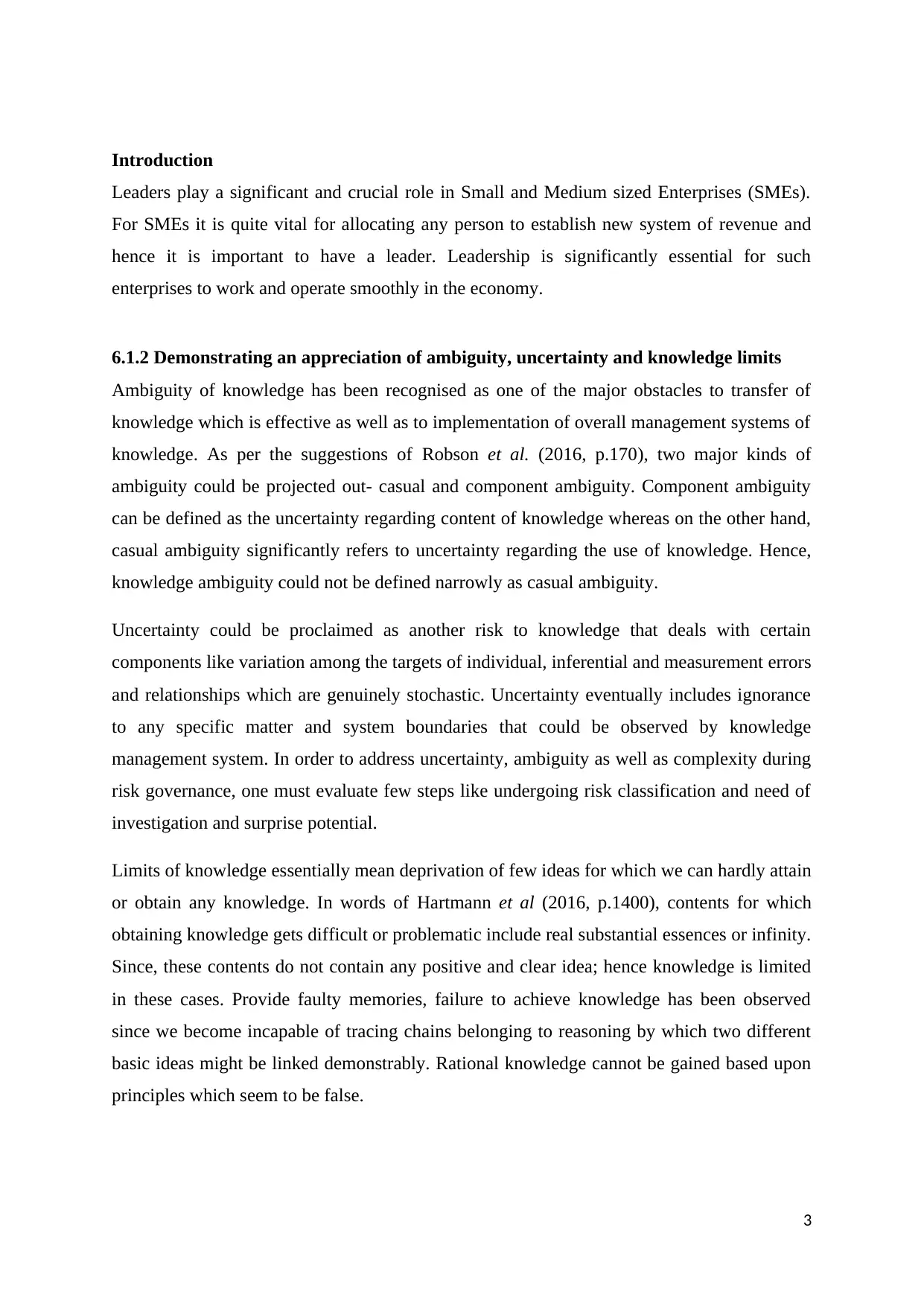
Introduction
Leaders play a significant and crucial role in Small and Medium sized Enterprises (SMEs).
For SMEs it is quite vital for allocating any person to establish new system of revenue and
hence it is important to have a leader. Leadership is significantly essential for such
enterprises to work and operate smoothly in the economy.
6.1.2 Demonstrating an appreciation of ambiguity, uncertainty and knowledge limits
Ambiguity of knowledge has been recognised as one of the major obstacles to transfer of
knowledge which is effective as well as to implementation of overall management systems of
knowledge. As per the suggestions of Robson et al. (2016, p.170), two major kinds of
ambiguity could be projected out- casual and component ambiguity. Component ambiguity
can be defined as the uncertainty regarding content of knowledge whereas on the other hand,
casual ambiguity significantly refers to uncertainty regarding the use of knowledge. Hence,
knowledge ambiguity could not be defined narrowly as casual ambiguity.
Uncertainty could be proclaimed as another risk to knowledge that deals with certain
components like variation among the targets of individual, inferential and measurement errors
and relationships which are genuinely stochastic. Uncertainty eventually includes ignorance
to any specific matter and system boundaries that could be observed by knowledge
management system. In order to address uncertainty, ambiguity as well as complexity during
risk governance, one must evaluate few steps like undergoing risk classification and need of
investigation and surprise potential.
Limits of knowledge essentially mean deprivation of few ideas for which we can hardly attain
or obtain any knowledge. In words of Hartmann et al (2016, p.1400), contents for which
obtaining knowledge gets difficult or problematic include real substantial essences or infinity.
Since, these contents do not contain any positive and clear idea; hence knowledge is limited
in these cases. Provide faulty memories, failure to achieve knowledge has been observed
since we become incapable of tracing chains belonging to reasoning by which two different
basic ideas might be linked demonstrably. Rational knowledge cannot be gained based upon
principles which seem to be false.
3
Leaders play a significant and crucial role in Small and Medium sized Enterprises (SMEs).
For SMEs it is quite vital for allocating any person to establish new system of revenue and
hence it is important to have a leader. Leadership is significantly essential for such
enterprises to work and operate smoothly in the economy.
6.1.2 Demonstrating an appreciation of ambiguity, uncertainty and knowledge limits
Ambiguity of knowledge has been recognised as one of the major obstacles to transfer of
knowledge which is effective as well as to implementation of overall management systems of
knowledge. As per the suggestions of Robson et al. (2016, p.170), two major kinds of
ambiguity could be projected out- casual and component ambiguity. Component ambiguity
can be defined as the uncertainty regarding content of knowledge whereas on the other hand,
casual ambiguity significantly refers to uncertainty regarding the use of knowledge. Hence,
knowledge ambiguity could not be defined narrowly as casual ambiguity.
Uncertainty could be proclaimed as another risk to knowledge that deals with certain
components like variation among the targets of individual, inferential and measurement errors
and relationships which are genuinely stochastic. Uncertainty eventually includes ignorance
to any specific matter and system boundaries that could be observed by knowledge
management system. In order to address uncertainty, ambiguity as well as complexity during
risk governance, one must evaluate few steps like undergoing risk classification and need of
investigation and surprise potential.
Limits of knowledge essentially mean deprivation of few ideas for which we can hardly attain
or obtain any knowledge. In words of Hartmann et al (2016, p.1400), contents for which
obtaining knowledge gets difficult or problematic include real substantial essences or infinity.
Since, these contents do not contain any positive and clear idea; hence knowledge is limited
in these cases. Provide faulty memories, failure to achieve knowledge has been observed
since we become incapable of tracing chains belonging to reasoning by which two different
basic ideas might be linked demonstrably. Rational knowledge cannot be gained based upon
principles which seem to be false.
3
⊘ This is a preview!⊘
Do you want full access?
Subscribe today to unlock all pages.

Trusted by 1+ million students worldwide
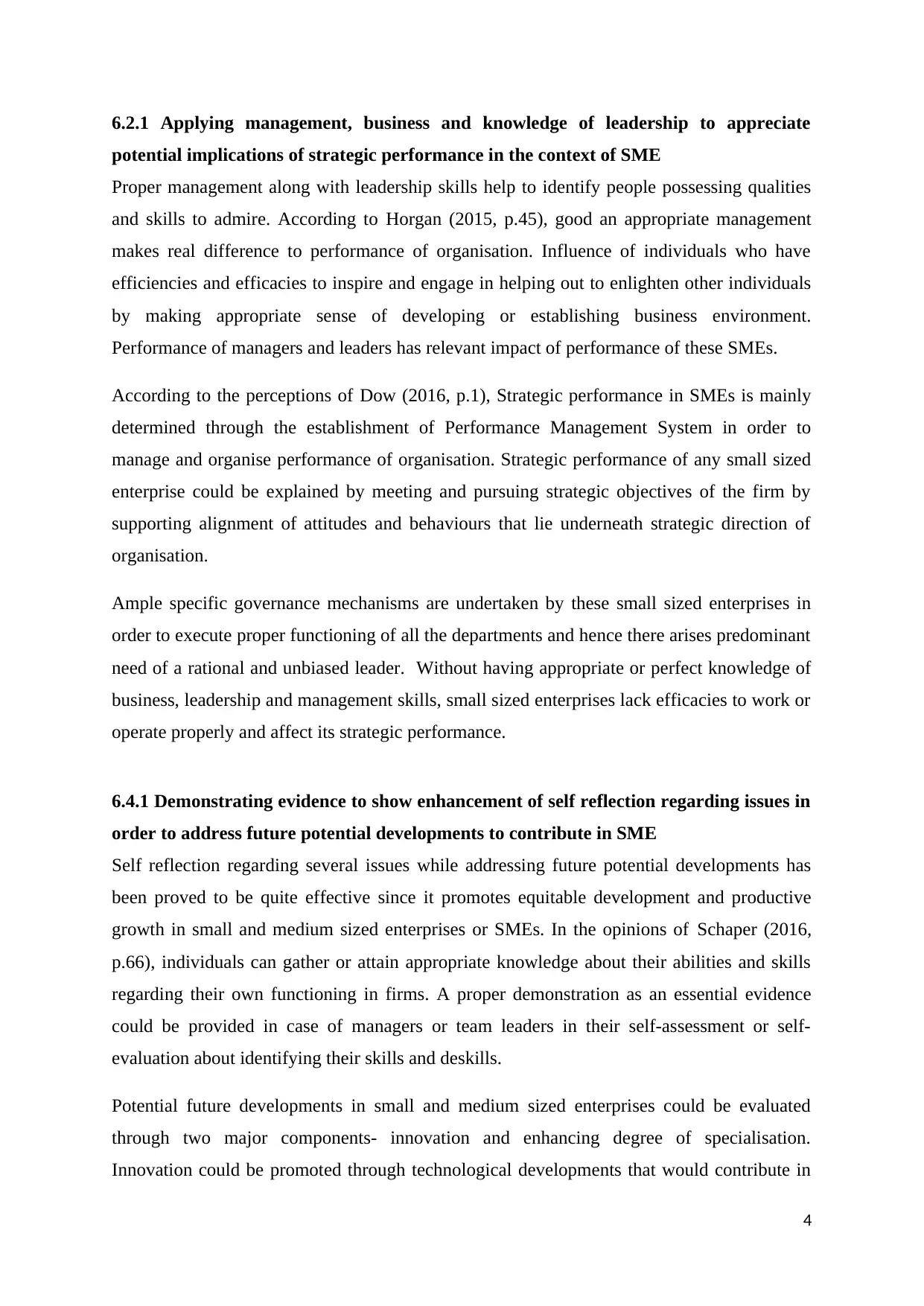
6.2.1 Applying management, business and knowledge of leadership to appreciate
potential implications of strategic performance in the context of SME
Proper management along with leadership skills help to identify people possessing qualities
and skills to admire. According to Horgan (2015, p.45), good an appropriate management
makes real difference to performance of organisation. Influence of individuals who have
efficiencies and efficacies to inspire and engage in helping out to enlighten other individuals
by making appropriate sense of developing or establishing business environment.
Performance of managers and leaders has relevant impact of performance of these SMEs.
According to the perceptions of Dow (2016, p.1), Strategic performance in SMEs is mainly
determined through the establishment of Performance Management System in order to
manage and organise performance of organisation. Strategic performance of any small sized
enterprise could be explained by meeting and pursuing strategic objectives of the firm by
supporting alignment of attitudes and behaviours that lie underneath strategic direction of
organisation.
Ample specific governance mechanisms are undertaken by these small sized enterprises in
order to execute proper functioning of all the departments and hence there arises predominant
need of a rational and unbiased leader. Without having appropriate or perfect knowledge of
business, leadership and management skills, small sized enterprises lack efficacies to work or
operate properly and affect its strategic performance.
6.4.1 Demonstrating evidence to show enhancement of self reflection regarding issues in
order to address future potential developments to contribute in SME
Self reflection regarding several issues while addressing future potential developments has
been proved to be quite effective since it promotes equitable development and productive
growth in small and medium sized enterprises or SMEs. In the opinions of Schaper (2016,
p.66), individuals can gather or attain appropriate knowledge about their abilities and skills
regarding their own functioning in firms. A proper demonstration as an essential evidence
could be provided in case of managers or team leaders in their self-assessment or self-
evaluation about identifying their skills and deskills.
Potential future developments in small and medium sized enterprises could be evaluated
through two major components- innovation and enhancing degree of specialisation.
Innovation could be promoted through technological developments that would contribute in
4
potential implications of strategic performance in the context of SME
Proper management along with leadership skills help to identify people possessing qualities
and skills to admire. According to Horgan (2015, p.45), good an appropriate management
makes real difference to performance of organisation. Influence of individuals who have
efficiencies and efficacies to inspire and engage in helping out to enlighten other individuals
by making appropriate sense of developing or establishing business environment.
Performance of managers and leaders has relevant impact of performance of these SMEs.
According to the perceptions of Dow (2016, p.1), Strategic performance in SMEs is mainly
determined through the establishment of Performance Management System in order to
manage and organise performance of organisation. Strategic performance of any small sized
enterprise could be explained by meeting and pursuing strategic objectives of the firm by
supporting alignment of attitudes and behaviours that lie underneath strategic direction of
organisation.
Ample specific governance mechanisms are undertaken by these small sized enterprises in
order to execute proper functioning of all the departments and hence there arises predominant
need of a rational and unbiased leader. Without having appropriate or perfect knowledge of
business, leadership and management skills, small sized enterprises lack efficacies to work or
operate properly and affect its strategic performance.
6.4.1 Demonstrating evidence to show enhancement of self reflection regarding issues in
order to address future potential developments to contribute in SME
Self reflection regarding several issues while addressing future potential developments has
been proved to be quite effective since it promotes equitable development and productive
growth in small and medium sized enterprises or SMEs. In the opinions of Schaper (2016,
p.66), individuals can gather or attain appropriate knowledge about their abilities and skills
regarding their own functioning in firms. A proper demonstration as an essential evidence
could be provided in case of managers or team leaders in their self-assessment or self-
evaluation about identifying their skills and deskills.
Potential future developments in small and medium sized enterprises could be evaluated
through two major components- innovation and enhancing degree of specialisation.
Innovation could be promoted through technological developments that would contribute in
4
Paraphrase This Document
Need a fresh take? Get an instant paraphrase of this document with our AI Paraphraser
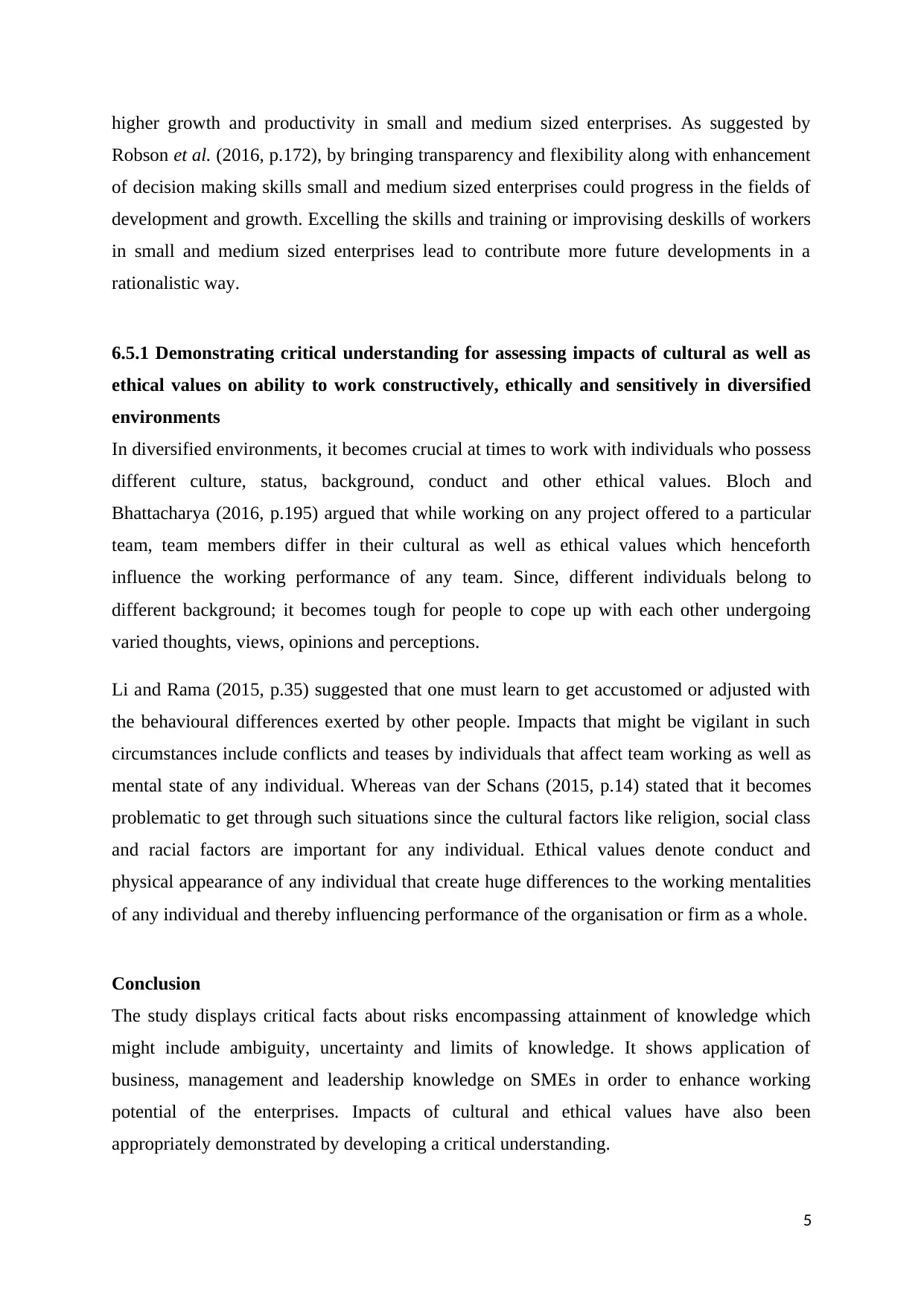
higher growth and productivity in small and medium sized enterprises. As suggested by
Robson et al. (2016, p.172), by bringing transparency and flexibility along with enhancement
of decision making skills small and medium sized enterprises could progress in the fields of
development and growth. Excelling the skills and training or improvising deskills of workers
in small and medium sized enterprises lead to contribute more future developments in a
rationalistic way.
6.5.1 Demonstrating critical understanding for assessing impacts of cultural as well as
ethical values on ability to work constructively, ethically and sensitively in diversified
environments
In diversified environments, it becomes crucial at times to work with individuals who possess
different culture, status, background, conduct and other ethical values. Bloch and
Bhattacharya (2016, p.195) argued that while working on any project offered to a particular
team, team members differ in their cultural as well as ethical values which henceforth
influence the working performance of any team. Since, different individuals belong to
different background; it becomes tough for people to cope up with each other undergoing
varied thoughts, views, opinions and perceptions.
Li and Rama (2015, p.35) suggested that one must learn to get accustomed or adjusted with
the behavioural differences exerted by other people. Impacts that might be vigilant in such
circumstances include conflicts and teases by individuals that affect team working as well as
mental state of any individual. Whereas van der Schans (2015, p.14) stated that it becomes
problematic to get through such situations since the cultural factors like religion, social class
and racial factors are important for any individual. Ethical values denote conduct and
physical appearance of any individual that create huge differences to the working mentalities
of any individual and thereby influencing performance of the organisation or firm as a whole.
Conclusion
The study displays critical facts about risks encompassing attainment of knowledge which
might include ambiguity, uncertainty and limits of knowledge. It shows application of
business, management and leadership knowledge on SMEs in order to enhance working
potential of the enterprises. Impacts of cultural and ethical values have also been
appropriately demonstrated by developing a critical understanding.
5
Robson et al. (2016, p.172), by bringing transparency and flexibility along with enhancement
of decision making skills small and medium sized enterprises could progress in the fields of
development and growth. Excelling the skills and training or improvising deskills of workers
in small and medium sized enterprises lead to contribute more future developments in a
rationalistic way.
6.5.1 Demonstrating critical understanding for assessing impacts of cultural as well as
ethical values on ability to work constructively, ethically and sensitively in diversified
environments
In diversified environments, it becomes crucial at times to work with individuals who possess
different culture, status, background, conduct and other ethical values. Bloch and
Bhattacharya (2016, p.195) argued that while working on any project offered to a particular
team, team members differ in their cultural as well as ethical values which henceforth
influence the working performance of any team. Since, different individuals belong to
different background; it becomes tough for people to cope up with each other undergoing
varied thoughts, views, opinions and perceptions.
Li and Rama (2015, p.35) suggested that one must learn to get accustomed or adjusted with
the behavioural differences exerted by other people. Impacts that might be vigilant in such
circumstances include conflicts and teases by individuals that affect team working as well as
mental state of any individual. Whereas van der Schans (2015, p.14) stated that it becomes
problematic to get through such situations since the cultural factors like religion, social class
and racial factors are important for any individual. Ethical values denote conduct and
physical appearance of any individual that create huge differences to the working mentalities
of any individual and thereby influencing performance of the organisation or firm as a whole.
Conclusion
The study displays critical facts about risks encompassing attainment of knowledge which
might include ambiguity, uncertainty and limits of knowledge. It shows application of
business, management and leadership knowledge on SMEs in order to enhance working
potential of the enterprises. Impacts of cultural and ethical values have also been
appropriately demonstrated by developing a critical understanding.
5
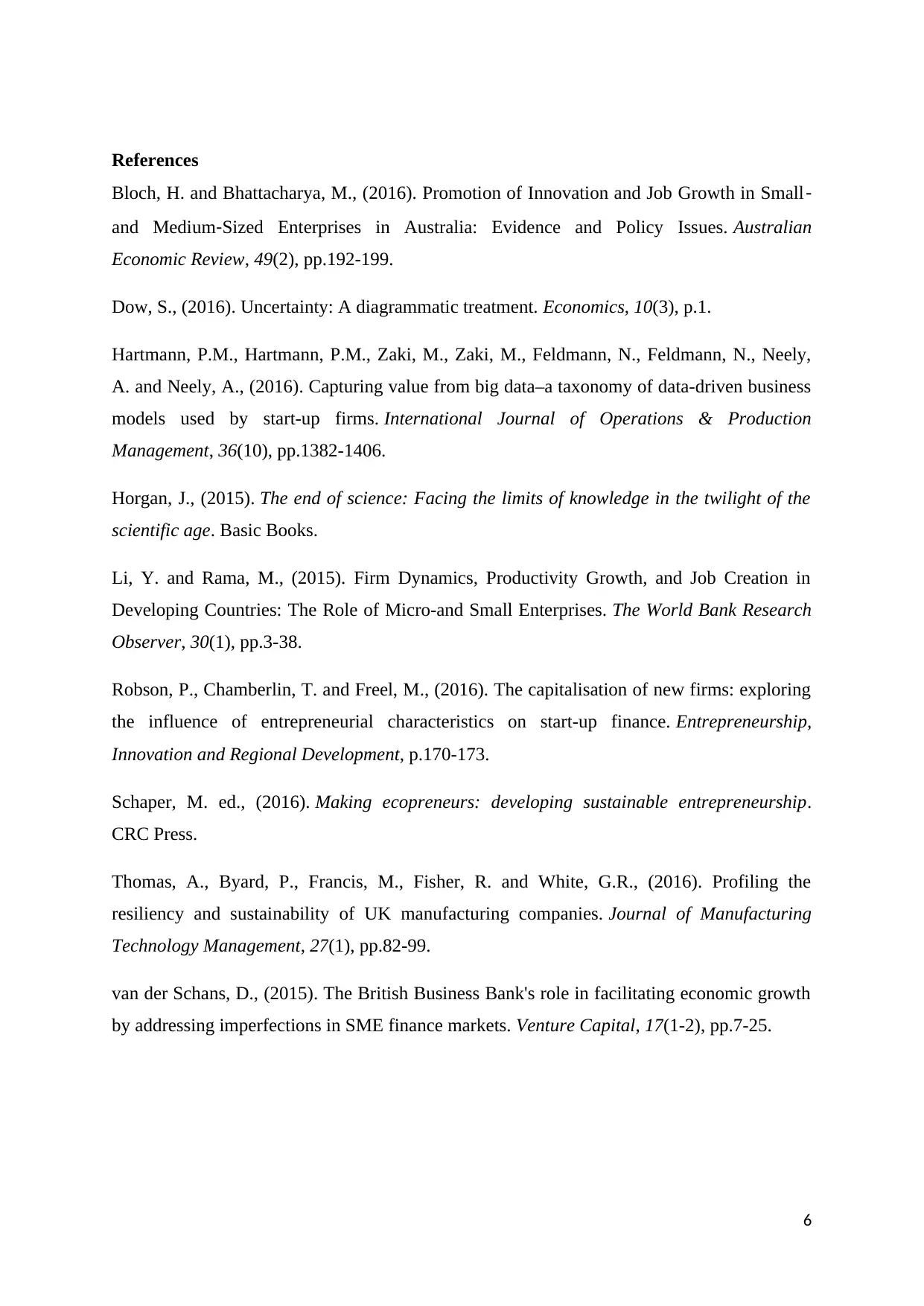
References
Bloch, H. and Bhattacharya, M., (2016). Promotion of Innovation and Job Growth in Small‐
and Medium‐Sized Enterprises in Australia: Evidence and Policy Issues. Australian
Economic Review, 49(2), pp.192-199.
Dow, S., (2016). Uncertainty: A diagrammatic treatment. Economics, 10(3), p.1.
Hartmann, P.M., Hartmann, P.M., Zaki, M., Zaki, M., Feldmann, N., Feldmann, N., Neely,
A. and Neely, A., (2016). Capturing value from big data–a taxonomy of data-driven business
models used by start-up firms. International Journal of Operations & Production
Management, 36(10), pp.1382-1406.
Horgan, J., (2015). The end of science: Facing the limits of knowledge in the twilight of the
scientific age. Basic Books.
Li, Y. and Rama, M., (2015). Firm Dynamics, Productivity Growth, and Job Creation in
Developing Countries: The Role of Micro-and Small Enterprises. The World Bank Research
Observer, 30(1), pp.3-38.
Robson, P., Chamberlin, T. and Freel, M., (2016). The capitalisation of new firms: exploring
the influence of entrepreneurial characteristics on start-up finance. Entrepreneurship,
Innovation and Regional Development, p.170-173.
Schaper, M. ed., (2016). Making ecopreneurs: developing sustainable entrepreneurship.
CRC Press.
Thomas, A., Byard, P., Francis, M., Fisher, R. and White, G.R., (2016). Profiling the
resiliency and sustainability of UK manufacturing companies. Journal of Manufacturing
Technology Management, 27(1), pp.82-99.
van der Schans, D., (2015). The British Business Bank's role in facilitating economic growth
by addressing imperfections in SME finance markets. Venture Capital, 17(1-2), pp.7-25.
6
Bloch, H. and Bhattacharya, M., (2016). Promotion of Innovation and Job Growth in Small‐
and Medium‐Sized Enterprises in Australia: Evidence and Policy Issues. Australian
Economic Review, 49(2), pp.192-199.
Dow, S., (2016). Uncertainty: A diagrammatic treatment. Economics, 10(3), p.1.
Hartmann, P.M., Hartmann, P.M., Zaki, M., Zaki, M., Feldmann, N., Feldmann, N., Neely,
A. and Neely, A., (2016). Capturing value from big data–a taxonomy of data-driven business
models used by start-up firms. International Journal of Operations & Production
Management, 36(10), pp.1382-1406.
Horgan, J., (2015). The end of science: Facing the limits of knowledge in the twilight of the
scientific age. Basic Books.
Li, Y. and Rama, M., (2015). Firm Dynamics, Productivity Growth, and Job Creation in
Developing Countries: The Role of Micro-and Small Enterprises. The World Bank Research
Observer, 30(1), pp.3-38.
Robson, P., Chamberlin, T. and Freel, M., (2016). The capitalisation of new firms: exploring
the influence of entrepreneurial characteristics on start-up finance. Entrepreneurship,
Innovation and Regional Development, p.170-173.
Schaper, M. ed., (2016). Making ecopreneurs: developing sustainable entrepreneurship.
CRC Press.
Thomas, A., Byard, P., Francis, M., Fisher, R. and White, G.R., (2016). Profiling the
resiliency and sustainability of UK manufacturing companies. Journal of Manufacturing
Technology Management, 27(1), pp.82-99.
van der Schans, D., (2015). The British Business Bank's role in facilitating economic growth
by addressing imperfections in SME finance markets. Venture Capital, 17(1-2), pp.7-25.
6
⊘ This is a preview!⊘
Do you want full access?
Subscribe today to unlock all pages.

Trusted by 1+ million students worldwide
1 out of 6
Your All-in-One AI-Powered Toolkit for Academic Success.
+13062052269
info@desklib.com
Available 24*7 on WhatsApp / Email
![[object Object]](/_next/static/media/star-bottom.7253800d.svg)
Unlock your academic potential
Copyright © 2020–2025 A2Z Services. All Rights Reserved. Developed and managed by ZUCOL.
